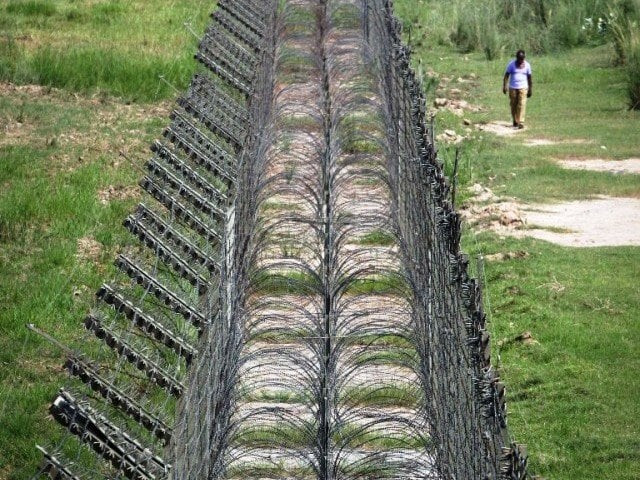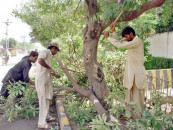Tension may force troops relocation from west front
Aggressive posturing cannot cow us down, says NSC

A file photo of Line of Control between Pakistan and India. PHOTO: REUTERS
The purpose of Indo-Pak rapprochement was simple — the then Bush administration wanted Pakistan to relocate its troops from the eastern border to the western front in order to fight al Qaeda and other militant groups. The move did work as months after the ceasefire came into effect, tens of thousands of Pakistani troops were deployed at the western border to deal with fleeing militants from Afghanistan.
Indian, Pakistani soldiers trade fresh fire across LoC
In April this year, Pakistan Army announced it had established the writ of state in the tribal regions. But the job is not done yet. That is why around 150,000 Pakistani troops are still stationed there to consolidate the gains against terrorism.
However, Pakistan now may rethink its strategy and priorities in the wake of increasing hostilities from India.
On Tuesday, the country’s civil and military leadership joined heads to discuss how to deal with rising tensions with India at a time when Pakistan’s fight against terrorism is at a critical stage.
The meeting of the National Security Committee (NSC), an apex forum for discussions on issues of national security, was presided over by Prime Minister Nawaz Sharif, and attended by the three services chiefs, chairman Joint Chiefs of Staff committee, head of Inter-Services Intelligence, director general of military operations, four chief ministers, foreign secretary and other senior figures.
After the extensive deliberations, the civil and military leadership concluded: “Escalation on LoC and eastern borders will shift Pakistan’s focus away from its efforts to eliminate terrorism from our soil at a critical stage, and is detrimental to the successes made by Pakistan in war on terror.”
The statement was aimed at sending out a clear message to world powers, including the US, to persuade India to pull back from brinkmanship or face the consequences.
According to official sources, NSC decided to convey Pakistan’s position to the US that it would be left with no other options but to pull out troops from the Afghan border if India does not de-escalate the situation.
Indian troops violate ceasefire along LoC for third time today
Ever since the India claimed to have conducted so-called surgical strikes on the Pakistani side of LoC, there has been a regular exchange of fire between the two countries at the de facto border.
Inter-Services Public Relations (ISPR) said Indian troops resorted to unprovoked firing in Baghsar, Broh and Khanjar areas in the Bhimber sector of the LoC on Tuesday. The intensity and increase in frequency of such cross LoC skirmishes raised fears of a possible enlarged military conflict between the two nuclear-armed neighbors.
Taking note of this belligerence from across the border, the NSC said, “Pakistan cannot be cowed down with hollow rhetoric and aggressive posturing.”
The forum expressed complete satisfaction over operational preparedness of the valiant armed forces and resolved that the entire nation stands shoulder to shoulder with its armed forces and will ensure defence of the country at any cost.
Referring to recent propaganda and false claims of surgical strikes made by India, the forum concluded that India should resolve the long standing issue of Kashmir for enduring peace in the region, instead of such futile efforts of diverting attention of the world.
“India must stop atrocities in Kashmir and recognise the just and legitimate struggle of Kashmiris for their right of self-determination,” the NSC demanded.
In his remarks the Prime Minister said Pakistan did not harbor any ‘aggressive designs’ against any country or nation. “We believe in peace and collective betterment,” he said. “However, our quest for peace must not be mistaken as a sign of weakness; our armed forces are fully capable of thwarting any kind of threat to our sovereignty and territorial integrity”, the prime minister pointed out.
He said that people of Indian-Occupied Kashmir are struggling for their inalienable right of self-determination guaranteed by UN Security Council resolutions, which cannot be suppressed through brutal oppression by Indian security forces.
“It is imperative that the UN and other countries fulfil their longstanding commitment to the innocent and defenceless people of Indian-occupied Kashmir. Pakistan and Kashmir are inseparable; we will continue to extend our moral, political and diplomatic support to Kashmiri people at every forum,” he stressed.
Published in The Express Tribune, October 5th, 2016.


















COMMENTS
Comments are moderated and generally will be posted if they are on-topic and not abusive.
For more information, please see our Comments FAQ